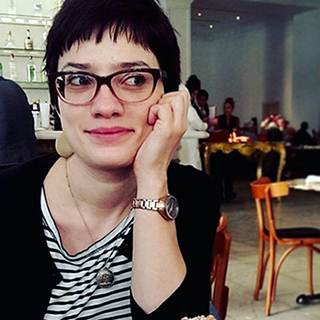Center for Advanced Genocide Research Awards Katja Schatte 2016-17 Greenberg Fellowship

Katja Schatte, a scholar of postwar East German Jewish history, will be in residence at USC Shoah Foundation Center for Advanced Genocide Research in spring 2017 as the Center’s 2016-17 Greenberg Research Fellow.
The Margee and Douglas Greenberg Research Fellowship is the Center’s first endowed fellowship, which enables one advanced-standing PhD candidate each year to spend up to one month at USC Shoah Foundation in Los Angeles conducting research in the Visual History Archive. The fellow is expected to give a public talk about his or her research at the end of their stay.
Schatte is the third annual Greenberg Research Fellow. The fellowship was endowed by Margee and Douglas Greenberg, former executive director of USC Shoah Foundation.
Schatte has a BA in social work from the Alice Salomon University of Applied Sciences in Berlin, an MA in Latin American Studies from the University of Chicago, an MA in history from the University of Washington, and is working toward her Ph.D. in East German Jewish History at the University of Washington.
Her dissertation is about Jewish women living in East Berlin from 1945 to 1990, including experiences of female Holocaust survivors, memory, post-memory and transgenerational trauma. Schatte will conduct interviews of her own with Jewish women who were raised in East Germany after World War II, and she hopes to study them in conjunction with the testimonies she is able to find in the Visual History Archive during her fellowship.
Schatte said many of the women she will interview are children of Holocaust survivors, so she’s interested in how their experiences in socialist East Germany after the war compare to previous generations, like the survivors in the Visual History Archive.
“It’s almost like a puzzle because many of the people I will be talking to are the children of survivors while the stories I’ll find in the archive will be women who survived the camps themselves,” Schatte said. “[I want] to get a better understanding how these experiences are related and combine that with my own research to think about these experiences and grappling with them across generations in this specific political system.”
She also wants to study Jewish life in East Germany after the war, which is difficult to decipher from official documents alone. Only about 400 people registered as Jews in East Germany after the war, but Schatte believes there were many more. Jewish women in particular, she believes, were integral in maintaining an active Jewish community.
“It’s clear from memoirs, my conversations with them, and essays that they were really active in community life in achieving Jewish identity and Jewish life after the Holocaust,” Schatte said.
“Many of the people I will be talking to are the children of survivors.”
Schatte is looking forward not just to diving into the Visual History Archive during her month in residence at USC Shoah Foundation, but also presenting her work in a public lecture and collaborating with other scholars at USC.
She is confident that the Greenberg Research Fellowship will give her the time and space to delve deeply into the experiences of Jewish women in East Germany after the war – even as they were giving their testimonies to USC Shoah Foundation.
“I’m very excited about [the fellowship] because I think this allows me to spend some more time with this angle of my research and that’s really exciting,” she said.